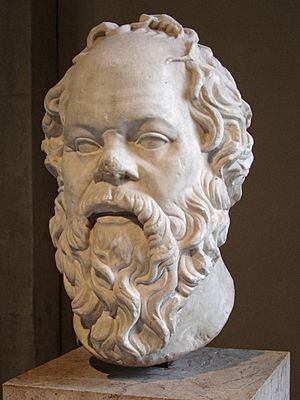Intellectualism facts for kids
Intellectualism is a way of thinking that focuses on using and developing your intellect, which means your ability to think and understand things. It's about living a "life of the mind."
In philosophy, intellectualism is similar to rationalism. This means it's about gaining knowledge through reason and logic, rather than just feelings or beliefs.
Sometimes, in sociology, the word "intellectualism" can have a negative meaning. It might suggest that someone thinks "too much" or is "too focused on ideas," possibly seeming cold or lacking emotions.
Contents
Ancient Ideas: Doing What's Right
The famous Greek philosopher Socrates (who lived around 470–399 BC) believed in something called moral intellectualism. He thought that if you truly understand what is right or best, you will naturally do it. For Socrates, being virtuous (doing good things) was all about your intellect. He believed that knowledge and virtue are connected. You get better at both by using your reason and thinking deeply.
Socrates's ideas led to some interesting thoughts, sometimes called "Socratic paradoxes." For example, he suggested that no one truly does evil on purpose. If someone does something wrong, it's because they don't fully understand what is good or right. He also believed that all good qualities (like bravery or fairness) are really just different forms of knowledge.
Truth and Self-Care
In ancient times, "knowing the truth" was often linked to "spiritual knowledge." It was part of "caring for the self." To become a moral person, people would practice ascetic exercises. These practices helped them truly learn and live by the truth.
So, understanding truth meant having "intellectual knowledge" that connected you to a universal truth. It helped you live an authentic life. This required constant self-care. It also meant being someone who truly lived the truth. Such a person could use parrhesia, which means "to speak honestly, even if it's difficult." It was a moral duty to speak the truth for everyone's benefit, even if it put you at risk.
Medieval Thinking: Intellect vs. Will
Medieval theological intellectualism was a belief about how God acts. It also described how humans make choices. This idea said that the intellect (our ability to think and understand) comes before and is more important than the will (our ability to choose). In simple terms, it meant that our choices are based on what our intellect tells us is good.
This idea was different from voluntarism. Voluntarism argued that the will is more important than the intellect or emotions. So, for intellectualism, your will is guided by what your mind sees as good. But for voluntarism, your will decides what is good, and it's free to choose.
Many important thinkers in the Middle Ages were intellectualists. These included the Spanish Muslim scholar Averroës (who lived from 1126–1198), the English theologian Roger Bacon, the Italian Christian theologian Thomas Aquinas (1225–1274), and the German Christian theologian Meister Eckhart (1260–1327).
See also
 In Spanish: Intelectualismo para niños
In Spanish: Intelectualismo para niños
- Anti-intellectualism
- Chinese intellectualism
- Intellectual
- Intellectual movements in Iran
- Intelligentsia
- Sanism
- Scientia potentia est
 | Delilah Pierce |
 | Gordon Parks |
 | Augusta Savage |
 | Charles Ethan Porter |


